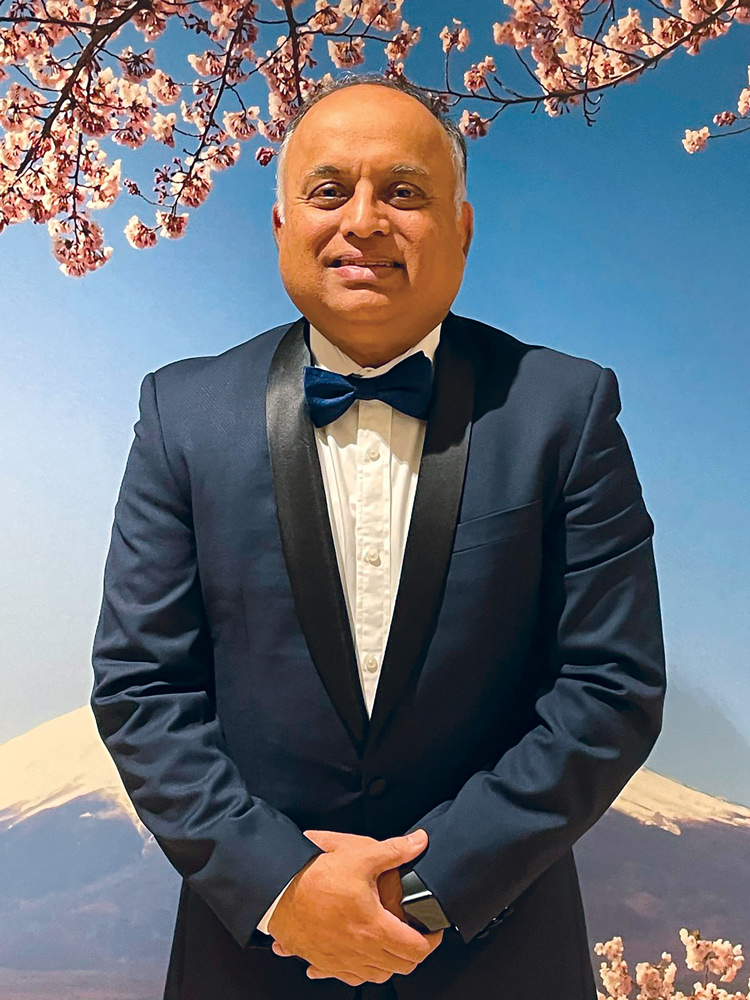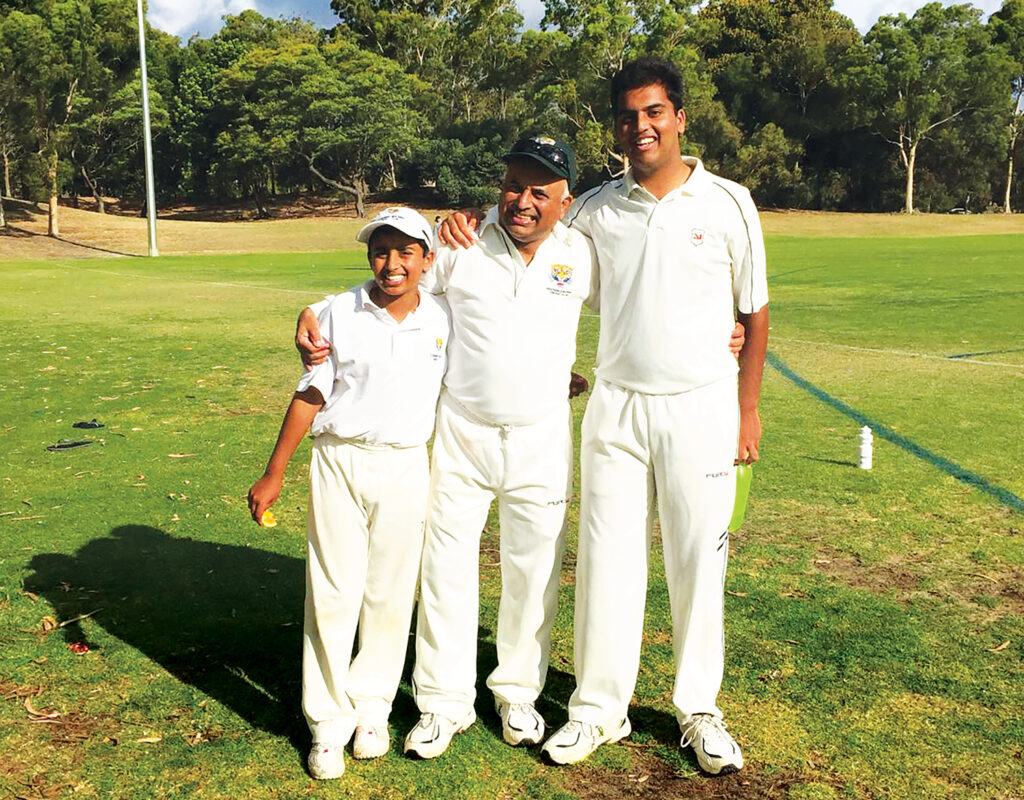 The cheeriest of optimists, oncologist Dr Sanjay Mukhedkar sees the glass half full, even in the grimmest of times.
The cheeriest of optimists, oncologist Dr Sanjay Mukhedkar sees the glass half full, even in the grimmest of times.
By Ara Jansen
Three Cs rule Dr Sanjay Mukhedkar’s life: cancer, cricket and cinema.
 The medical oncologist was born and raised in Hyderabad, India, by two doctors who valued education. Sanjay, the elder of two boys, often joined his father on home visits and carried his kit bag.
The medical oncologist was born and raised in Hyderabad, India, by two doctors who valued education. Sanjay, the elder of two boys, often joined his father on home visits and carried his kit bag.
“His patients saw him as a bit of a demi god,” says Sanjay of his father. “He was a lifesaver. Patients respected him and were grateful. The patients used to call me ‘little doctor’ so I started to think it was my destiny and the universe wanted me to be a doctor. I never entertained anything else. I grew up as a doctor.”
Sanjay was also a very talented chess player but in the 1970s no one thought it possible to make money from such a sport. His father dismissed the idea in favour of medical school, calling it a hobby not a profession. In hindsight Sanjay agrees with him.
“I still play chess and once I hit 60 – I’m now 58 – I want to play on the senior chess circuit.” He’s also taught chess at a local high school.
He studied at Hyderabad’s Osmania Medical College, gaining his qualifications as a general surgeon. His subsequent route to Perth took a somewhat circuitous path. After marrying Dr Ashwini Davray, a specialist physician in palliative medicine, in 1994, they lived and worked over the next decade in New Zealand twice, resat their qualifications, worked in New York and returned to India for a spell.
During that very busy time trying to establish themselves, their eldest son lived with his grandparents in Bahrain for a year. Once settled back in New Zealand, the family were reunited, and their second son was born. Sanjay and Ashwini took turns getting their RACP qualifications while raising their sons and being away from familial support.
“I felt like that was the first major failure in my life,” he says about having to go back to study and largely start over professionally after a decade. “It was quite soul shattering and I was depressed.”
That lifted when Sanjay unexpectedly transitioned into oncology after working with a doctor in Tauranga, on the NZ north island for six months.
“I thought it would be too depressing but, instead, in those six months, I was blown away. Never had my work been so appreciated. It was something so different that I had never experienced before.
“Those last six to 12 months are a spiritual journey for the patients. Their time is limited, they know it and they thank everyone around them. It’s very beautiful and during that time a lot of people learn the art of living. It has taught me to always say thank you loudly and profusely.
“This work has had a huge influence on me. I realised I needed to use my life to help people and give back to the community. We are Hindu by faith, but service to humanity is my religion. It’s gratifying to help people.”
The Mukhedkars were considering other cities, such as Toronto, London and Edinburgh, but Sanjay was offered a job at Sir Charles Gairdner Hospital and the family moved to Perth in 2003. The city was also closer to India in case anyone had to rush back. He started as a trainee at Charlies, in 2006 completed his training, and became a junior consultant at Fremantle Hospital, later moving to St John of God Murdoch where Sanjay has been ever since.
In 2010, he established Oncology West with Associate Professor Kynan Feeney and Dr Daphne Tsoi. It’s now the largest private group of cancer specialists in WA.
Never one to rest on his laurels, Sanjay is on the board of Cyclowest, a group committed to providing nuclear treatment to patients around the world. Sanjay is working to achieve its vision of developing modern cyclotron and GMP radiopharmaceutical facilities for Australian and Asia-Pacific markets.
Sanjay’s goal is to give smaller communities in Asian countries, particularly in rural India, access to these facilities in portable form.
In December, he was named St John of God Murdoch’s top doctor for 2023. Sanjay feels a circle was completed because his father had won a similar award from his hospital in India at the same age.
“It took me 17 years to receive this award and I’m very grateful. It was very special for me because of the joy I could see in my wife’s and my boys’ eyes.”
While it doesn’t fit into the pithy three Cs, family is also hugely important to Sanjay. With two busy parents, Thursday is date night for the couple when they’ll usually try a new restaurant, and Tuesday night is reserved for karaoke.
Sanjay refuses to be drawn on how good a singer he is or isn’t, but insists his wife has a “lovely voice”. They also share a love for Bollywood films and take every opportunity to catch up on the latest ones.
The pair met at medical school and started dating. When they decided it was something more serious, it was time to get the blessings from their families. In a country known for its arranged marriages, Sanjay and Ashwini made a love match. Their grandparents were a little hesitant at first, but the pair eventually won them over.
“We were very clear on that. We wanted everyone to bless our marriage. We believe a lot in those blessings and we have managed to be together almost 30 years and still going strong. We’re soul mates, but that’s hard work.”
 Ever the proud dad, Sanjay says his sons Varun, an environmental engineer, and economics student Varad, have this wonderful ability to move between their Indian heritage and their Australian upbringing.
Ever the proud dad, Sanjay says his sons Varun, an environmental engineer, and economics student Varad, have this wonderful ability to move between their Indian heritage and their Australian upbringing.
“I love that they can be Indian and speak to their relatives and also be with their Aussie friends having a barbecue. It gave me great pleasure that they went to India on their own last year to see the Cricket World Cup.”
Speaking of cricket, Sanjay loves to watch the game and play it, something he plans to continue doing well into his 60s. He spends hours on the cricket pitch – he’ll happily play in 40 degrees – and founded the Australian Indian Medical Association cricket team, the AIMA Tigers. In their third year, they’re a competitive lot.
“I was playing every Saturday and as the local Indian community continued to grow, I felt it was a good way to bring people together. All on the team are doctors, we’re all crazy about cricket and don’t take defeat very well.”
He’s also starting a cricket academy where young, talented Indian players who couldn’t otherwise afford it are able to come to Perth, play cricket and participate in skills workshops. Sanjay also plays in an over-50s team and the AIMA field a team in an indoor women’s competition.
“I never want to stop playing. A healthy mind needs a sound body. I always encourage people to play sport. I’m a big believer in it for mental and physical health. Plus, humans are social animals, we like to be with our friends. One of the biggest disasters we are dealing with at the moment is loneliness. If our needs are met, the next big thing we need is to feel wanted and loved, that’s so very important. Sport can help with that.
“Physical activity is also important for male bonding. I encourage group sport to bring people together in a team, rather than striving for individual glory. That’s like medicine – people working as a team.”

